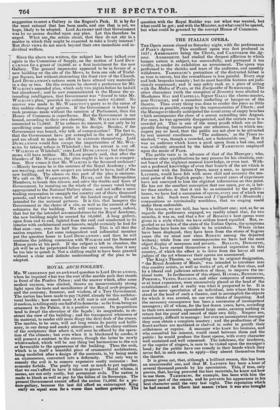THE ITALIAN OPERA.
THE Opera season closed on Saturday night, with the performance of PAER'S Agnese. This excellent opera was first produced in 1817; AMBROGETTI being the Uberto, and CAMPORESE the Ag- nate. AMBROGETTI bad studied the deepest affliction to which human nature is subject, too successfully, and portrayed it too vividly, to render its exhibition an amusement. The opera was performed to the shrieks and tears of the audience, and speedily withdrawn. TAMBURINI'S portraiture of the distracted father is as true to nature, but the resemblance is less painful. Every step and look bespeaks insanity ; but its most horrible features are judi- ciously suppressed; and it may safely rank as a piece of acting with the Medea of PASTA or the Euryanthe of SCHROEDER. The other characters (with the exception of Ernesto) were allotted to Mesdames GAI and CASTELLI, Signor GALLI the chorus-master, poor GIUBILEI, and a nameless underling or hanger-on of the theatre. Thus every thing was done to render the piece as little attractive as possible, except by the representation of Uberto; and the Manager evidently anticipated the usual array of empty benches which accompanies the close of a season extending into August. For once, he was agreeably disappointed, and the curtain rose to a crowded pit. This is one of the many proofs which are so fre- quently forcing themselves upon our attention, but to which ma- nagers pay no heed, that the public are not slow to be attracted by real musical excellence. "The audience," as the Times re- marked, " was, though a crowded, not a fashionable one." But it was an audience which knew a good opera from a bad one, and was evidently attracted by the talent of TAMBURINI employed upon the music of PAER.
The public taste is in advance of that of the Manager; who, whatever other qualifications he may possess for his situation, can- not boast of the slightest musical knowledge, or even tact. With- out a profound knowledge of even that branch of the art which is connected with the Italian Opera, many a man, as ignorant as LAPORTE, would have felt with more skill and accuracy the mu- sical pulse of the English people : but several years of experience have not conveyed to him the slightest information on this point. He has not the smallest conception that one opera, per se, is bet- ter than another, or that it can be so estimated by the public : hence, we have had a succession of operas, every one of which was sure to fail. Such were Norma and I Capuleti ed i Monteechi ; compositions so intrinsically worthless, that no singing could make them endurable.
The season, we are told, has been a brilliant one; and, as far as regards the performers engaged, we readily admit that, for two months, it was so, and that a few of ROSSINI'S best operas were given in a style which we have seldom heard equalled. But, re- garded as an index of the state of the Italian Opera, the symptoms of decline have been too visible to be mistaken. Where riches have been displayed, they have been from the stores of bygone years (for we must now class ROSSINI among the departed writers); while from our contemporaries we have had the most abject display of meanness and poverty. BELLINI, DONIZETTI, and Co., have earned themselves a musical reputation in this country, of which the effect is to drive from the house all real judges of the art whenever their operas are announced. The King's Theatre, or, according to its original designation, " the Royal Academy of Music," was intended to introduce into this country artists, as well as works of art, of the first class, and by a liberal and judicious selection of these, to improve the na- tional taste. In furtherance of this object, HANDEL, BONONCINI, PORPORA, VENTO, SACCHINI, and other composers of eminence, or at least experience, were successively placed at the head of the establishment; and it really was what it purported to be. It is now the mere speculation of an individual, into whose fitness to stand at the head of such a theatre, and to accomplish the objects for which it was erected, no one ever thinks of inquiring. And the necessary consequence has been a succession of incompetent managers; all of whom,. for the last dozen years, have, according to their own accounts, squandered large sums, earning nothing in return but the proof and record of their own folly. Singers are, notoriously, difficult to manage : but over an incompetent manager, they soon obtain a complete mastery ; and the productions of the finest authors are mutilated or shelved in order to gratify their selfishness or caprice. A manager who knew his business, and who consulted his interest, would stand between them and the public : he would produce the finest operas, with every character well sustained and well rehearsed. The indolence, the insolence, or the caprice of singers, is sure to be visited upon the mane-gees head; for the public have one remedy in their hands which they never fail, in such cases, to apply—they absent themselves from the theatre.
It is given out, that, although a brilliant season, this has been an unsuccessful one, and that M. LAPORTE has been a loser of several thousand pounds by his speculation. This, if true, only proves, that, having procured the best materials, he knew not how to use them. TAMBURINI, for example, has been with him the greater part of the season, and he prevents his appearance in his best character until the very last night. The reputation which he had earned in Uberto last season (when it was also brought


















 Previous page
Previous page